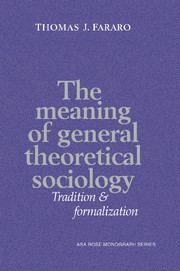Book contents
- Frontmatter
- Contents
- List of Figures and Tables
- Preface
- Introduction
- Chapter 1 A philosophy of general theoretical sociology
- Chapter 2 Dynamical social systems and the key problems
- Chapter 3 Action theory and social order
- Chapter 4 Structuralism and unification
- Summary
- Notes
- References
- Index of names
- Index of subjects
- Other books in the Arnold and Caroline Rose Monograph Series of the American Sociological Association
Chapter 3 - Action theory and social order
Published online by Cambridge University Press: 10 December 2009
- Frontmatter
- Contents
- List of Figures and Tables
- Preface
- Introduction
- Chapter 1 A philosophy of general theoretical sociology
- Chapter 2 Dynamical social systems and the key problems
- Chapter 3 Action theory and social order
- Chapter 4 Structuralism and unification
- Summary
- Notes
- References
- Index of names
- Index of subjects
- Other books in the Arnold and Caroline Rose Monograph Series of the American Sociological Association
Summary
Introduction
The first chapter of this book interpreted general theoretical sociology as a comprehensive research tradition with a number of important subtraditions. This research tradition, it was maintained, is based on a process worldview. Both individuals and societies are enduring forms of order. And endurance is problematic. Structure is not an ultimate given but a conditional attainment. Yet, for our purposes, not all instances of endurance present problems for theory. It is social structures that are the conditional attainments requiring our explanatory efforts. Under what conditions does interaction yield or reproduce stable social structures? How do we compare such structures? How do such structures change as to type?
Such questions show that the process worldview leads directly into dynamical social systems, treated in the second chapter. The tradition of general theoretical sociology was drawn upon to state formally four key problems and a corresponding set of four types of theorems about social structure. These are at the core of the knowledge quest of the comprehensive tradition. The four types of theorems, arrived at through the study of the properties of definite model objects, pertain to the emergence, maintenance, comparison, and change of social structures.
However, in exhibiting the logic of these ideas in the study of theoretical models, two conceptual problems were located and discussed at the end of Chapter 2. These problems arose by comparison of the theoretical logic of the models with the emerging consensual do's and don'ts of the comprehensive tradition.
- Type
- Chapter
- Information
- The Meaning of General Theoretical SociologyTradition and Formalization, pp. 153 - 254Publisher: Cambridge University PressPrint publication year: 1989



